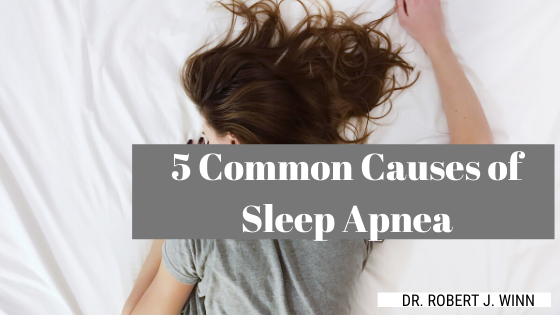Even in its mildest form, a case of sleep apnea can become an extremely disrupting element in a person’s life. At its worst, however, sleep apnea can bring about brain damage or even death.
Whether a sleep-deprived person crashes their car due to impaired levels of mental cognition or suffers a fatal stroke due to a sleep apnea-related blood pressure spike, an untreated case of the condition can be truly catastrophic in its effects. Here are just a few common causes of sleep apnea, and why there is often a light at the end of the tunnel for individuals looking for ways to overcome this condition.
- Carrying Too Much Weight on the Body
When we’re overweight, our bodies may experience much difficulty in keeping our airways clear while we’re sleeping due to excess pressure around the throat area. That kind of pressure can lead to a severe case of sleep apnea over time; fortunately, losing weight via a change to one’s diet or exercise routine can often significantly improve or even cure the condition.
- High Blood Pressure
Sadly, a case of high blood pressure and sleep apnea often work against one another. High blood pressure can cause sleep apnea, and because the body gets less oxygen at night when it is affected by sleep apnea, for example, a person’s blood pressure may skyrocket between bouts of sleep. The circular nature of this combination makes it particularly dangerous.
Some people can become intensely anxious about their distressed sleeping patterns and elevated heart rate; the resulting stress can lead to progressively higher blood pressure levels and progressively worse sleep. The good news is that a healthy diet and a good exercise routine can often do much to alleviate high blood pressure levels. By extension, that can significantly help reduce symptoms of sleep apnea.
- Dental Issues
For many people, sleep apnea is a byproduct of grinding one’s teeth or other dental issues. When we sleep, the muscles at the back of the throat relax as well as the tongue. Sometimes that results in an obstruction of the airway. Tension in the jaw caused by grinding can send signals to your brain to wake up to breathe. The good news is that dentists and oral surgeons can often help individuals with jaw alignment issues seek effective treatment options for these conditions.
- Excessive Alcohol Use
Although alcohol use may actually exacerbate or even cause a case of sleep apnea, many individuals ironically use alcohol to get a “better” night’s sleep. The results can be disastrous. Unfortunately, alcohol can cause a person’s throat muscles to loosen during the night and block the intake of oxygen to the lungs.
- Smoking
It should come as no surprise that a smoking habit can cause a person to develop a bad case of sleep apnea. After all, cigarette smoke can irritate the throat and cause tissue there to swell; this process can block the airway and prevent an individual from getting enough oxygen at night. At the end of the day, it’s just one more good reason to quit this troubling (but highly-addictive) habit.


